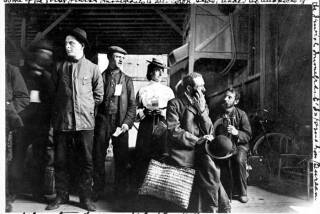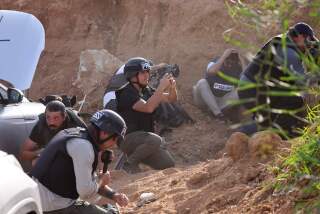Guests Include Journalists and Diplomats : Jerusalem Hotel Weathers Crises With Aplomb
- Share via
JERUSALEM — When Secretary of State George P. Shultz decided to meet a delegation of prominent Palestinians in February, his aides had no trouble choosing a meeting place.
The Palestinians, in an act of political defiance, refused to meet with him. But Shultz kept the appointment anyway and ended up reading his speech to a row of empty chairs at the American Colony Hotel in East Jerusalem.
Quick visits by U.S. secretaries of state barely faze the staff at the American Colony, which politely shuttled a visiting Australian journalist out of his room to accommodate Shultz.
After all, the hotel has been efficiently coping with crisis since World War I, when the management efficiently produced a white bed sheet so that the mayor of Ottoman Jerusalem could surrender the city to the advancing British army led by Gen. Edmund Allenby.
It is almost axiomatic among journalists that every conflict requires a great hotel: Witness the Caravelle in Saigon or the Commodore in Beirut, each in its own way becoming part of the lore of the conflict. In Jerusalem, for those covering the more than 6-month-old Palestinian uprising in the occupied territories, that hotel is the American Colony.
Perhaps more than most, the American Colony has become part of the story, so much so that the mere act of residence at the hotel has become a bone of contention between journalists and the Israeli government.
Since the start of the Palestinian uprising in the Israeli-occupied West Bank and Gaza Strip last December, the hotel has been virtually full with journalists, aid workers and others whose livelihoods seem inextricably linked with the disturbances.
In the historic courtyard, journalists meet with Arab and Israeli sources, photographers gather to exchange gossip and film crews prepare to leave for the nearest incident of violence.
One prominent Israeli lawyer described the Colony as the “PLO Hotel,” referring to the Palestine Liberation Organization, and American journalists are often scolded by Israeli government officials for “staying on the other side.” East Jerusalem is mostly Arab.
While the Colony has prospered during the conflict, other hotels have seen their business slump because tourists, worried about the violence on their television screens every night, sent the Israeli tourism industry into a severe recession.
“I know they think we’re a PLO hotel, but we’re not really,” said Val Lester, an ebullient Englishwoman who is one of the Colony’s owners. “We’re neutral. We’re foreigners sitting in the middle of it.”
Explained Tim Phelps, Middle East correspondent for the New York newspaper Newsday, who has spent six months at the Colony: “It’s an oasis, a garden in the midst of all this turmoil. It’s a place to retreat to, and the most beautiful hotel I’ve ever seen.”
The hotel was originally the private home of a prominent Jerusalem businessman, Rabbah Husseini, who built the main building in the mid-19th Century to house his four wives.
The complex obtained its unusual name when it became home to a group of American Christians who moved to the Holy Land in the late 19th Century to found what was to become the first collective in the Middle East, predating the Jewish kibbutzim by a generation.
The prime movers in the Colony were a wealthy Chicago couple, Horatio and Anna Spafford, who left the United States after four children of theirs drowned in a shipwreck and a fifth was killed by scarlet fever. It was a time when many Protestant sects felt that chronic bad luck was a sign of sinfulness.
Originally a clinic in the Old City, the buildings that constitute the present hotel were acquired in the 1880s to house the expanding colony of Americans.
One early guest at the Colony wrote: “It’s a sort of free hotel for everyone who needs shelter. Bedouins, Arabs, Jews and all sorts of people drop in there and are kindly entertained.”
The neutrality of the American Colony soon became a watchword, a reputation that the Spafford family tried to preserve into the modern era. The Colony started to accept paying guests, pilgrims mostly, referred by Baron Platon Ustinov, grandfather of the actor Peter Ustinov.
During World War I, the Colony was used primarily as a clinic, sheltering the war wounded of all sides. In 1917, the first journalist arrived, the American Lowell Thomas.
By the time Palestine was partitioned into Arab and Jewish states in 1948, most of the original members of the American Colony had left except for the Spafford family. The hotel found itself on the edge of no-man’s-land--in Arab Jerusalem.
During the 1948 Israeli War of Independence, the hotel was hit by a mortar, toppling one of the palm trees that Ustinov had planted in the hotel courtyard as a gift.
Lowell Thomas recalled Bertha Spafford, daughter of the Chicago couple, sternly ordering a Jordanian officer away from the hotel. “To fire from the shelter of the American Colony,” Thomas recalled her saying, “is the same as firing from a mosque or a church.”
Trapped on the Arab side of the dividing line after the 1948 war, the American Colony eked out its existence from Christian pilgrims visiting the Holy Land, primarily at Easter and Christmas.
In the 1967 Six-Day War, the American Colony found itself in the center of the fighting for Jerusalem. The hotel was hit by two shells, and the building was emptied. The Vester family woke up to find their hotel in a new country, Israel, and set about re-establishing its reputation.
Val Vester, whose late husband Horatio was the son of Bertha Spafford, said they considered selling the hotel but that Jerusalem Mayor Teddy Kollek encouraged them to remain and preserve one of the city’s most unusual landmarks.
Although Jerusalem is now united under Israeli rule, the frequent strikes and occasional acts of violence have deterred Israelis from visiting East Jerusalem. For the same reason, Palestinians are reluctant to travel to West Jerusalem, where the Israeli government maintains an official press center.
As a result, many Palestinian groups now use the Colony to hold press conferences or informally to meet with journalists who are invariably in the vicinity.
“In West Jerusalem, I’m bound to be frisked if I walk into a hotel,” said Jonathan Kuttab, a Palestinian civil rights lawyer. “The American Colony is a safe place even in these times of tensions between Israelis and Palestinians.”
Added Bill Lee, an information officer for the U.N. Works and Relief Agency: “The staff treat you like a family. And whatever is happening outside, the hotel immediately cools you down. There’s a real atmosphere of peace.”
The Colony lacks many of the amenities that journalists usually seek out in a hotel. Because of the odd relationship between East Jerusalem and the rest of the city, the telephone service is among the worst in Israel.
But the hotel, under Swiss management since 1980, has a decent kitchen, an historic cellar bar--”the journalists are the best patrons,” Val Vester noted--and for free-lance journalists without a steady income, the hotel still offers a few rooms for $35 a night.
“Whenever I come here I learn something,” said the U.N.’s Bill Lee. “In the end you don’t feel like you’re in a hotel, but someone’s house.”
More to Read
Sign up for Essential California
The most important California stories and recommendations in your inbox every morning.
You may occasionally receive promotional content from the Los Angeles Times.













